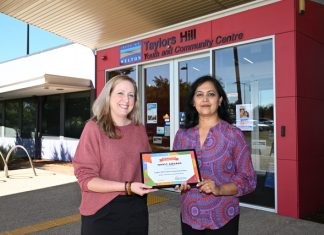Lunchtime prayer and bible study groups run by teachers or volunteers have been banned at state schools in Victoria under a new education department policy.
The new policy has angered Christian groups who say it could be in breach of human rights and religious freedom.
The ban, which has taken many by surprise, came into effect on July 14, as part of changes to the controversial special religious instruction requirements.
New guidelines allowing principals to cease offering special religious instruction if there are insufficient resources, such as teachers or classrooms, have been widely publicised.
However the policy also states that lunchtime prayer groups and religious clubs cannot be conducted by staff, parents, visitors or volunteers.
This affects all state secondary schools, as well as primary schools, where special religious instruction is typically provided.
The policy says legislation requires that government schools are secular and special religious instruction is the only exception to this. The distribution of religious texts such as the Bible or Koran by any person is also prohibited.
Christian schools ministry Mustard used to hold lunchtime groups run by volunteers at nine Victorian state secondary schools.
However, Mustard was advised by the schools it could no longer conduct the groups under the policy changes this term.
“There has been disappointment across the board, definitely,” said Mustard director Tim Clare.
“We totally understand schools are secular – we are respectful of that environment. Our particular focus was to support students who have a faith.”
Peter Stevens, the Victoria state officer of Christian ministry FamilyVoice, called on Education Minister Martin Dixon to rescind the “unjust and unwarranted order”.
“We used to joke about US school prayer bans but now Australia is going down the same path,” he said.
“Freedom of speech and human rights are fundamental human rights in this state – but not, it seems, in our public schools.”
Pastor Stevens said FamilyVoice’s supporters would be “absolutely horrified” by the new guidelines.
“It’s not a total ban on religion but I believe the intent of it is heading that way. It’s just really come to light. I think we all read the information a month ago and didn’t take it seriously enough.”
A Victorian Education Department spokesman said students were free to bring religious materials to school.
Students could also form lunchtime religious clubs among themselves if permitted by the school but representatives from religious organisations or parents were not permitted to run them.
Teachers were also prohibited from taking religious instruction (this did not include teaching general religious education.)
Victorian director Dan Flynn said the Australian Christian Lobby believed the changes made to the special religious instruction policy eroded religious freedom.
“Students and teachers have the rights to freedom of religion and belief, freedom of expression and freedom of association under the Charter of Human Rights and Responsibilities Act,” he said.
“It is important that faith-based groups continue to be able to be invited to schools just like non-religious groups.”
Mr Flynn said the Education and Training Reform Act required education in government schools to be secular. “It does not mean that voluntary extra-curricular student groups and activities have to be secular,” he said. “Such groups can observe and promote particular religions.”








